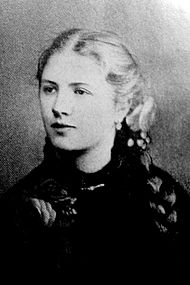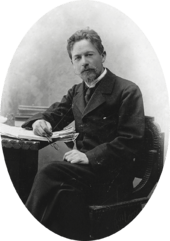Lydia Avilova facts for kids
Quick facts for kids
Lydia Avilova
|
|
|---|---|
 |
|
| Born | Lydia Alexeyevna Strakhova Лидия Алексеевна Страхова 15 June [O.S. 3 June] 1864 Tula Governorate, Imperial Russia |
| Died | 27 September 1943 (aged 79) Moscow, Soviet Union |
| Occupation | short story writer • novelist • memoirist |
| Nationality | Russian |
Lydia Alexeyevna Avilova (Russian: Ли́дия Алексе́евна Ави́лова, born Strakhova, 15 June 1864 – 27 September 1943) was a Russian writer. She is best known for her book A.P. Chekhov in My Life. This book was published after she passed away in 1947.
Contents
Lydia Avilova's Life and Works
Early Life and First Steps in Writing
Lydia Alekseyevna Strakhova was born in 1864. Her family lived on an estate called Klekotki in the Tula Governorate of the Russian Empire. Her family belonged to the local gentry, which meant they were from a well-known and respected family.
After finishing school, called a gymnasium, in 1882, she worked as a school teacher for a short time. In 1887, she got married and moved from Moscow to Saint Petersburg. This is when she started her journey as a writer.
Lydia often visited the home of Sergey Khudekov, a famous editor and publisher. His wife, Nadezhda, was Lydia's sister. Through these visits, Lydia met many well-known authors of her time. In 1889, she met Anton Chekhov, a very famous writer. They started writing letters to each other often. Chekhov gave her lots of advice on how to improve her writing style and technique. He even helped her get some of her stories published.
Becoming a Published Author
In 1890, Lydia Avilova published her first short story. It was called "Two Beauties" (Две красоты). She got help from another writer, Alexander Sheller-Mikhaylov, to get it published. After this, her stories started appearing regularly in popular magazines. These included Sever (North), Detskoye Chteniye (Children's Reading), Niva, Russkiye Vedomosti, Syn Otechestva, and Novoye Slovo.
In 1896, Avilova's first collection of stories came out. It was titled Lucky Man and Other Stories (Счастливец и другие рассказы). Two years later, her first novel, Inheritors (Наследники), was published. Her second novel, Deceit (Обман), was published in July 1901 in the magazine Vestnik Evropy.
Later Years and Literary Societies
In 1906, Avilova and her family moved back to Moscow. Over the next ten years, she published several more books. These included The Power and Other Stories (Власть и другие рассказы, 1906) and First Grief and Other Stories (Первое горе и другие рассказы, 1913). Many of these stories focused on childhood and how children think and feel. They were often inspired by Chekhov's writing style.
In 1914, Avilova became a member of the Russian Literary Society. In 1918, she joined the Union of Writers. In 1922, she visited her daughter in Czechoslovakia who was unwell. There, she became close to a group of Russian people who had moved away from Russia. However, she decided to return to the Soviet Union in 1924. She famously wrote, "Where there is no Russia, there is no myself." In 1929, she was made an honorary member of The Soviet Chekhov society.
Lydia Avilova passed away in Moscow on 27 September 1943. She was buried at the Vagankovo Cemetery. Sadly, the exact location of her grave has been lost over time. In the 1980s, people became interested in Avilova's writings again. Several of her books were re-published in the USSR.
Avilova's Memoirs and Chekhov
Lydia Avilova's last work was a book of memoirs. A memoir is a type of autobiography, where a writer shares their memories and experiences from a specific time in their life. Her book was called A.P. Chekhov in My Life. She finished it in 1939, but it was published after her death in 1947.
This book caused a lot of discussion. Avilova wrote that she and Chekhov had a very special and close connection that lasted for about ten years, and that no one else knew about it. She believed that Chekhov's story "About Love" (published in 1898) was a hidden message about their relationship. She even claimed that one of his letters to her, which she later destroyed, was signed "Alyuokhin," the name of the main character in that story.
Not everyone agreed with Avilova's claims. Maria Chekhova, Anton Chekhov's sister, was doubtful. She wrote in her own book, From Distant Past: "These memoirs are lively and exciting, and many of the things she states in them are undoubtedly true... Lydia Alexeyevna seems to be totally sincere when describing her own feelings to Anton Pavlovich... When it comes to his own feeling towards her, things start to look a bit too 'subjective'." This means Maria thought Avilova was honest about her own feelings, but perhaps not as accurate about Chekhov's feelings towards her.
However, another famous writer, Ivan Bunin, believed Avilova completely. He wrote: "Avilova's memoirs, brilliant, highly emotional, written masterfully and with great tact, became a revelation to me. I knew well Lydia Alexeyevna, a gifted woman with a rare sense of humour, who was also a very honest and shy person... Never did I suspect though, that they had this sort of relationship."
Avilova also wrote about other famous writers, including Leo Tolstoy and Maxim Gorky. She shared her thoughts on their talents and personalities. She wrote that Chekhov was a "likeable, talented author, an intelligent man and an intriguing character." She described Gorky as "a brilliant writer and highly original man." For Tolstoy, she wrote: "a great writer, a great thinker and a great man." She saw Chekhov's talent as something that pushed him forward, Gorky's talent and personality as equally strong and blended, and Tolstoy's as perfect and almost divine.
 | John T. Biggers |
 | Thomas Blackshear |
 | Mark Bradford |
 | Beverly Buchanan |


